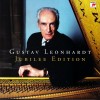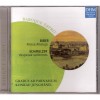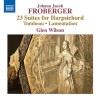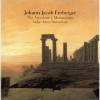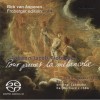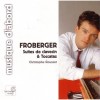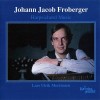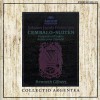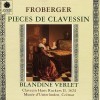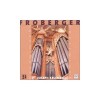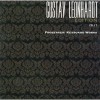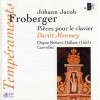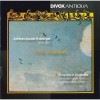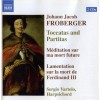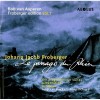传记
Johann Jakob Froberger (baptized 19 May 1616 – 7 May 1667) was a German Baroque composer, keyboard virtuoso, and organist. He was among the most famous composers of the era and influenced practically every major composer in Europe by developing the genre of keyboard suite and contributing greatly to the exchange of musical traditions through his many travels. He is also remembered for his highly idiomatic and personal descriptive harpsichord pieces, which are among the earliest known examples of program music.
Only two of Froberger's many compositions were published during his lifetime,[1] but his music was very widely spread in manuscript copies and he was one of the very few 17th century composers who were never entirely forgotten. His works were studied in the 18th century (although perhaps not very extensively, and certainly without influence on the emerging Classical style) by Handel, Bach and, extraordinarily, even Mozart and Beethoven.
1616–1634: Early years in Stuttgart
Johann Jakob Froberger was baptized on 19 May 1616 in Stuttgart. The exact date of his birth is unknown. His family came from Halle, where his grandfather Simon lived[2] and his father Basilius (1575–1637) was born. In 1599 Basilius moved to Stuttgart and became a tenor in the Württemberg court chapel. At some point before 1605 he married Anna Schmid (1577–1637), who came from a Schwabian family living in Stuttgart. By the time Johann Jakob was born, his father's career was already flourishing, and in 1621 Basilius became court Kapellmeister. Of his eleven children with Anna, four became musicians (Johann Jakob, Johann Christoph, Johann Georg and Isaac; all but Johann Jakob served at the Württemberg court in Stuttgart[3]), and so it is likely that Johann Jakob received his first music lessons from his father.
Although the Thirty Years' War which started in 1618 undoubtedly made life in Stuttgart somewhat more difficult, the city's musical life was rich and varied, influenced by musicians from all over Europe, so already at the very beginning of his life Froberger must have been exposed to a wide variety of musical traditions. Little is known about his actual education, though. His teachers possibly included Johann Ulrich Steigleder, and he might have met Samuel Scheidt during the latter's visit to Stuttgart in 1627; it is possible that Froberger sang in the court chapel, but there is no direct evidence to that; and court archives indicate that one of the English lutenists employed by the court, Andrew Borell, taught lute to one of Basilius Froberger's sons in 1621–22[2] – it is not known whether this son was Johann Jakob, but if so, it would explain his later interest in French lute music.
Basilius Froberger's music library probably also helped in Johann Jakob's education. It contained more than a hundred volumes of music, including works by Josquin des Prez,[4] Samuel Scheidt and Michael Praetorius, as well as pieces by the lesser known Johann Staden, founder of the Nuremberg school, and Giovanni Valentini, the then-famous Viennese Kapellmeister who later taught Johann Kaspar Kerll.
1634–1649: Court service in Vienna and voyages to Italy
The Hofkapelle Stuttgart was disbanded in 1634 in the wake of the Protestants' defeat in the Battle of Nördlingen. In Grundlage einer Ehrenpforte (1740) Mattheson writes that a certain Swedish ambassador was so impressed with Froberger's musical skills that he took the 18-year old musician to Vienna and presumably recommended him to the imperial court. This seems unlikely, however, because at the time Sweden was allied with Lutheran Württemberg against the imperial forces; so exactly why Froberger left for Vienna at around 1634 and how he managed to find employment as a singer in the imperial chapel, remains a mystery.
In 1637 Basilius Froberger, his wife and one his daughters died of plague. Johann Jakob and his brother Isaac sold their father's music library to the Württemberg court (this is how the contents of Basilius' library became known – through the court archives); the same year Johann Jakob became court organist in Vienna, assisting Wolfgang Ebner. In June he was granted a leave and a stipend to go to Rome to study under Frescobaldi. Froberger spent the next three years in Italy and, like many other musicians who went to study there, apparently converted to Catholicism. He returned to Vienna in 1641 and served as organist and chamber musician until the fall of 1645, when he took a second trip to Italy. It was previously thought that Froberger went to study under Giacomo Carissimi, but recent research shows that he most probably studied with Athanasius Kircher in Rome.[6] If so, Froberger's intention must have been acquiring mastery of vocal composition of the prima pratica (Frescobaldi, who taught him instrumental writing, died in 1643). Sometime during 1648–49 Froberger might have met Johann Kaspar Kerll, and possibly taught him.
In 1649 Froberger travelled back to Austria. On his way back he stopped in Florence and Mantua to show the arca musurgica, a powerful compositional device Kircher taught him, to some of the Italian princes. In September he arrived in Vienna and demonstrated the arca musurgica to the Emperor, an avid amateur musician; he also presented him with Libro Secondo, a collection of his own compositions (the Libro Primo is now lost). Also in September, Froberger played before William Swann, an English diplomat.[2] Through Swann he got to know Constantijn Huygens, who became Froberger's lifelong friend and introduced the composer to works by contemporary French masters – Jacques Champion de Chambonnières, Denis Gaultier and Ennemond Gaultier.
1649–1653: Years of travels
Following the Empress Maria Leopoldine's death in August the court's musical activities were suspended. Froberger left the city and travelled widely for the next four years, likely entrusted by the Emperor with some extra-musical duties in the fields of diplomacy and possibly espionage (as for example John Dowland and Peter Paul Rubens were doing during their travels). Not much is known about these voyages. Dresden was probably one of the very first cities Froberger visited: he played before the electoral court of John George I and presented the Elector with a collection of his works. He also met Matthias Weckmann while in Dresden, and this encounter turned to another lifelong friendship; the two continued to exchange letters and Froberger even sent some of his music to Weckmann to illustrate his style. According to a pupil, after Dresden Froberger visited Cologne, Düsseldorf, Zeeland, Brabant and Antwerp;[2] we also know that he also visited Brussels at least two times (in 1650 and 1652), London (after a disastrous voyage during which Froberger got robbed, an event he described musically in Plainte faite à Londres pour passer la mélancholie) and, most importantly, Paris (at least once, in 1652).
In Paris Froberger most probably became acquainted with many major French composers of the era, including Chambonnières, Louis Couperin, Denis Gaultier and possibly François Dufault. The latter two were famous lutenists writing in the characteristic French idiom of style brisé, which influenced Froberger's later harpsichord suites. In turn, Louis Couperin was profoundly influenced by Froberger's style; one of his unmeasured preludes even bears the subtitle "à l'imitation de Mr. Froberger". In November 1652 Froberger witnessed the death of the famed lutenist Blancrocher (who was his friend and reportedly died in his arms). Although Blancrocher himself was not an important composer,[7] his death left a mark on the history of music, as Couperin, Gaultier, Dufaut and Froberger all wrote tombeaux lamenting the event.
1653–1667: Last years in Vienna, retirement and death
In 1653 Froberger passed through Heidelberg, Nuremberg and Regensburg before returning to Vienna in April. He remained with the Viennese court during the next four years, producing at least one more collection of music, the Libro Quarto of 1656 (Libro Terzo is now lost). Froberger was apparently deeply saddened by Emperor Ferdinand III's death on 2 April 1657 and wrote a lamentation dedicated to the memory of the Emperor [5]. His relationship with Ferdinand's successor, Leopold I, was strained for a number of political reasons (numerous forces were opposed to Leopold's election, and among them were the Jesuit order and Johann Philipp von Schönborn, Elector-Archbishop of Mainz; Froberger's mentor and friend Kircher was an important figure in the former, and Froberger had strong ties with the court of the latter.[2] Froberger did, however, dedicate a new volume of his works to Leopold), and on June 30, 1657 Froberger received his last salary as a member of the imperial chapel.
Little is known about Froberger's last 10 years. Most of the information comes from the letter exchange between Constantijn Huygens and the dowager Duchess of Montbéliard, Sybilla (1620–1707). Since the death of her husband Léopold-Frédéric of Württemberg-Montbéliard in 1662 the Duchess lived in Héricourt (near Montbéliard, then territory of the house of Württemberg; now département Doubs), and Froberger became her music teacher at around the same time (this indicates that Froberger must have maintained a link with the ducal family of Württemberg since his Stuttgart years). He lived in Château d’Héricourt, the dower house of Duchess Sibylla. The Huygens-Sybilla letters indicate that in 1665 Froberger travelled to Mainz, where he performed at the court of the Elector-Archbishop of Mainz and met Huygens in person for the first time; and at a certain point in 1666 the composer had plans to return to the imperial court in Vienna. As far as is known, though, he never did, and lived in Héricourt until his death on 6 or 7 May 1667. Froberger apparently knew that he was going to die soon, as he made all necessary preparations a day before he died.







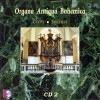
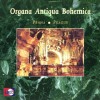
![Het Historische Orgel in Nederland [CD 2 of 20]](http://static.classicalm.com/repository/collection-cover/small/983-img1343144263780366.jpg)
